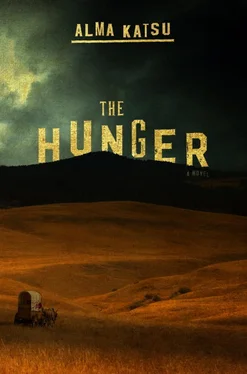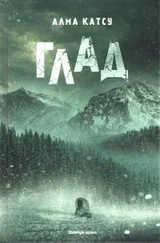Алма Катсу - The Hunger
Здесь есть возможность читать онлайн «Алма Катсу - The Hunger» весь текст электронной книги совершенно бесплатно (целиком полную версию без сокращений). В некоторых случаях можно слушать аудио, скачать через торрент в формате fb2 и присутствует краткое содержание. Город: New York, Год выпуска: 2018, ISBN: 2018, Издательство: G. P. Putnam's Sons, Жанр: Ужасы и Мистика, Историческая проза, на английском языке. Описание произведения, (предисловие) а так же отзывы посетителей доступны на портале библиотеки ЛибКат.
- Название:The Hunger
- Автор:
- Издательство:G. P. Putnam's Sons
- Жанр:
- Год:2018
- Город:New York
- ISBN:978-0-735-21251-0
- Рейтинг книги:4 / 5. Голосов: 1
-
Избранное:Добавить в избранное
- Отзывы:
-
Ваша оценка:
- 80
- 1
- 2
- 3
- 4
- 5
The Hunger: краткое содержание, описание и аннотация
Предлагаем к чтению аннотацию, описание, краткое содержание или предисловие (зависит от того, что написал сам автор книги «The Hunger»). Если вы не нашли необходимую информацию о книге — напишите в комментариях, мы постараемся отыскать её.
The Hunger — читать онлайн бесплатно полную книгу (весь текст) целиком
Ниже представлен текст книги, разбитый по страницам. Система сохранения места последней прочитанной страницы, позволяет с удобством читать онлайн бесплатно книгу «The Hunger», без необходимости каждый раз заново искать на чём Вы остановились. Поставьте закладку, и сможете в любой момент перейти на страницу, на которой закончили чтение.
Интервал:
Закладка:
“Whatever it was, it was hungry,” Donner commented—his face was leached of color. “We should bury the remains. We don’t want any of the women or children to see this.”
Eddy spat. “What about the parents? Somebody’s got to say whether this is the right boy or not—”
“We’re in the middle of nowhere. The next white settlement is days away,” Wolfinger said. “Who else could it be?” Wolfinger had emerged as the leader of the German emigrants in the party, translating for the ones who knew no English. They kept mostly to themselves, and often huddled around their campfires at night, speaking rapid-fire German—though Stanton hadn’t failed to miss Wolfinger’s pretty, young wife, Doris, whose hands looked like they were made for playing a piano, not carrying firewood or tugging on reins.
In the end, a couple of men went for shovels. Others wandered back to check on their families, to wake their sleeping children or simply to look at them, be reassured by their presence.
Stanton rolled up his sleeves and took a turn digging.
They didn’t need a large hole to accommodate the remains—there was so little of the boy—but they wanted it deep so that no animal would go after the bones. Besides, the physical exertion felt good. Stanton wanted to be tired tonight when he went to bed.
Too tired to dream.
Predictably, although George Donner stayed, he did nothing more than heap a few shovelfuls of dirt onto the grave. When at last they were done, Donner said a brief halting prayer over the fresh dirt. The old words sounded thin in the night air.
Donner and Stanton walked back to the wagons together, along with James Reed and Bryant. Stanton didn’t know Reed well and wasn’t sure he wanted to. He’d been well known among business leaders back in Springfield, but not well liked.
Reed held a dying torch overhead, but the flame could do little against the darkness that surrounded them. He and Donner floated in and out of the light, their pale faces bobbing on the periphery like ghosts. The ground was uneven and treacherous underfoot, broken up by prairie dog tunnels and clumps of tall grass. The hot summer air, so oppressive during the day, had cooled but was still dry and dusty.
“I’ve never seen anything like that,” Reed said at length, breaking the silence. “I agree with your earlier assessment, Mr. Bryant. If it were an animal that attacked, it would have been messier. The answer is obvious. Indians—it had to be Indians.” He raised a hand to stop Bryant from interrupting. “I know you claim to be some kind of expert on Indians, Mr. Bryant. You go live with them and talk to them and take all manner of notes for this book of yours. But you’ve never fought them, never faced them in anger as I have. I know what they’re capable of.” Reed told anyone who would listen that he’d fought in the Black Hawk War, probably so the tough old trail hands would stop treating him like a tenderfoot.
Bryant’s voice was mild. “That’s right, Mr. Reed. Everything I know about Indians I’ve learned from talking to them as opposed to shooting at them from across a field. But arguing won’t resolve anything. Even you must agree that if we let people think the Indians are responsible, things will go bad pretty fast. We’re traveling through Indian territory. The last thing we need is for people to panic. Besides,” he said, as Reed opened his mouth to object, “I’ve never heard of an Indian custom where they slaughter and dress a body like that.”
Donner jerked around to look at him. “Slaughtered and dressed? You make it sound like the boy was butchered.”
Bryant said nothing. He didn’t have to.
“Butchering implies that this was deliberate,” Stanton said. Even the words had a foul taste. “But if not Indians, then who?”
The set of Bryant’s mouth was grim. “We can’t ignore the possibility that whoever killed the boy is part of the wagon train. Someone already among us.”
The silence was tense. “Nonsense,” Reed muttered. The handkerchief came out, as it always seemed to when Reed was nervous. A tell.
“Surely a man like that would stand out, wouldn’t he?” Donner fidgeted with his coat buttons. “His behavior would give him away.”
Stanton knew that wasn’t necessarily true. Seeing the dead boy reminded him of an earlier time in his hometown in Massachusetts, when he’d seen the woman he loved pulled from the ice-capped water and laid out on the snow. Lydia. Fifteen years had passed and he could still barely stand to remember. She’d looked as though she’d just gone to sleep, her expression as peaceful as that boy’s: a lie. He remembered her dark lashes fanned against skin that had turned pale blue from being in the water so long, her lips purple as a bruise. Something terrible had compelled her across the thin frozen ice of the river that winter day, an evil that lived among them that he had failed to see. In this, at least, his grandfather had been correct. Evil was invisible, and it was everywhere.
“Sometimes a crazy man can act normal when he has to,” Bryant said. “He might be able to hide for a while longer. He might be able to hide his true nature indefinitely .”
Reed swiped his forehead. “All I know is, it’s a good thing Colonel Russell quit when he did. It’s time for a new captain.”
Stanton glanced over at Donner, whose usual swagger looked a little off-kilter in the bobbing light of Reed’s torch. Donner was one of Russell’s lieutenants, and he had obviously loved his appointment and all the little duties that came with it. He liked having a say in the way things were run; he certainly liked being looked up to and seemed to crave the admiration of others. Stanton respected him less for it.
“You’re not going to try to blame this on Russell, are you?” Bryant asked.
“He never should have been made captain in the first place. This wouldn’t have happened under a stronger man,” Reed said, clearing his throat. Stanton thought he knew what was coming next. “My reputation, I believe, speaks for itself.”
“I’d be careful not to overestimate your position,” Donner said, his big wide face shiny as he turned toward the light. “You may be a good businessman, but I don’t know that it counts for much out here on the trail.”
“I’m already one of the leaders of this party, in fact, if not in title. You can’t deny it,” Reed said stiffly. Stanton had to agree; whenever an important decision needed to be made, people almost instinctively turned to James Reed.
“You’d have us kill the first Indian we see,” Donner spluttered. “You’d have us go to war, when we have no evidence whatsoever of what or who killed that boy.”
“I see. And I suppose you think that you would make a better party captain than I would?” Reed’s voice was cutting.
Even in the scant light of the dying torch, Stanton saw Donner redden. “As a matter of fact, I do. I have experience leading the wagon train. People know me—and like me. It’s important to be liked, James—you shouldn’t underestimate that.”
Reed scowled at Donner. “I’d rather be respected than liked.”
Donner gave him a thin, insincere smile. “That’s why you won’t be elected captain. You can’t expect to just step in and boss people around. You have to earn people’s respect—and you haven’t earned it, not yet.”
Reed stopped dead. His head seemed to swell so full with rage that it might burst. “And do you think people respect you? Everyone knows you can’t even stand up to your own wife .”
At this, the rest of the group halted, too. Stanton shifted uncomfortably in the dusty air as he watched George Donner’s face go pale in the darkness until he seemed almost bloodless. He was standing perfectly still, his clublike hands hanging at his sides, towering over James Reed. But Reed stood his ground and, in that moment, seemed the stronger.
Читать дальшеИнтервал:
Закладка:
Похожие книги на «The Hunger»
Представляем Вашему вниманию похожие книги на «The Hunger» списком для выбора. Мы отобрали схожую по названию и смыслу литературу в надежде предоставить читателям больше вариантов отыскать новые, интересные, ещё непрочитанные произведения.
Обсуждение, отзывы о книге «The Hunger» и просто собственные мнения читателей. Оставьте ваши комментарии, напишите, что Вы думаете о произведении, его смысле или главных героях. Укажите что конкретно понравилось, а что нет, и почему Вы так считаете.







![Алма Катсу - Голод [litres]](/books/432580/alma-katsu-golod-litres-thumb.webp)




